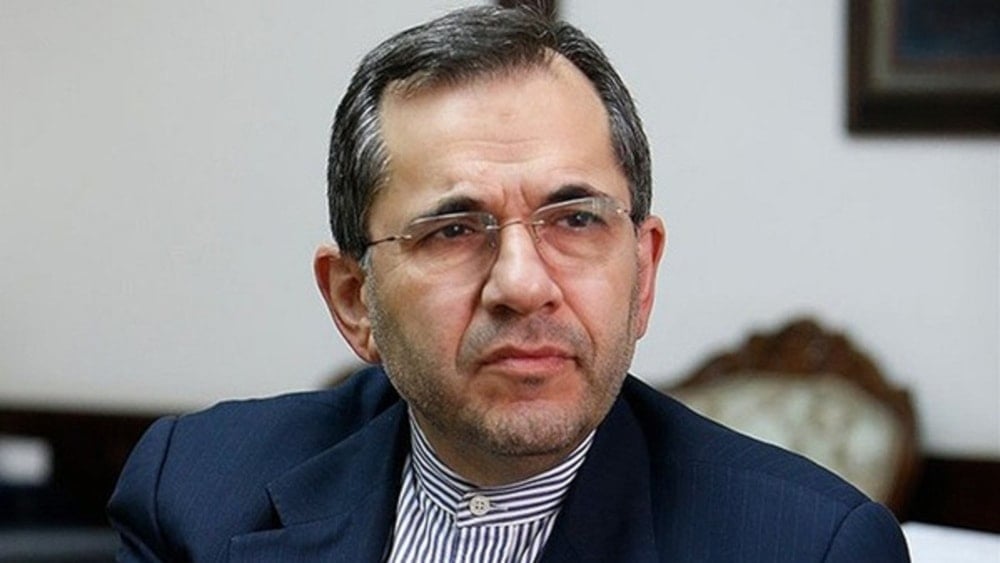Iran: 0% enrichment ‘non-negotiable’, defense capabilities ‘red line'
Iran’s deputy foreign minister reaffirms non-negotiable red lines in the nuclear talks and emphasizes strategic ties with Russia and China.
-

Iran's Deputy Foreign Minister for Political Affairs Majid Takht Ravanchi. (via Press TV)
Iran's Deputy Foreign Minister Majid Takht-Ravanchi emphasized to parliament that the country’s red lines, namely defense capabilities and regional power, were non-negotiable, as is zero uranium enrichment a non-starter.
During a briefing to the Parliament’s Committee on National Security and Foreign Policy, Takht-Ravanchi provided an update on the third round of indirect talks between Iran and the United States, which took place in Muscat, Oman, the day before. The discussions, led by Iranian Foreign Minister Abbas Araghchi and US envoy Steve Witkoff, also included technical-level talks between experts from both nations.
Michael Anton, the US State Department’s head of policy planning, led Washington's expert-level delegation, while Iranian Deputy Foreign Ministers Kazem Gharibabadi and Majid Takht-Ravanchi headed Tehran's team.
During the meeting, Takht Ravanchi emphasized, as quoted by Ebrahim Rezaei, the parliamentary committee's spokesperson, that Iran’s negotiating team had not discussed its red lines and that the talks were solely focused on the nuclear issue. Takht Ravanchi explained that the aim of the talks in Muscat was to build confidence in the peaceful nature of Iran’s nuclear program in exchange for the lifting of sanctions.
Rezaei stated that the talks stressed the need for lifting sanctions on sectors such as oil, petrochemicals, gas, banking, and shipping, as well as the release of Iran’s foreign assets. The officials also highlighted the importance of removing trade, industrial, mining, transportation, and insurance bans, along with terminating sanctions on individuals and institutions.
He stressed that Iran’s nuclear issue should be resolved in both the UN Security Council and the International Atomic Energy Agency’s Board of Governors. The Iranian lawmaker also reaffirmed Parliament’s commitment to supporting any action that safeguards the nation's interests, security, and dignity, emphasizing that the talks must ensure these goals are met.
The snapback mechanism
“Another issue emphasized in this meeting was that if the snapback mechanism is activated, we will activate our own levers, one of which is withdrawal from the NPT (Non-Proliferation Treaty),” Rezaei said.
As of today, the DPRK is the only country that has officially withdrawn from the Non-Proliferation Treaty (NPT).
The DPRK announced its withdrawal from the NPT in 2003 after the United States and other nations raised concerns over its nuclear weapons program.
The snapback mechanism outlined in UN Resolution 2231 allows the permanent members of the Security Council and Germany to reinstate UN sanctions if Iran violates its obligations under the Joint Comprehensive Plan of Action (JCPOA), which was signed in 2015 to limit Iran's nuclear program in exchange for the lifting of Western sanctions.
However, after the US withdrew from the deal in 2018 under US President Donald Trump's first term, and reinstated sanctions, Iran began scaling back its commitments about 1.5 years later, as the remaining European signatories failed to commit to their obligations as per the deal.
POTUS may not like the 2015 nuclear deal. But it contains one vital commitment by Iran which remains in place, and which even the US—being out of the deal—has benefited from:
— Seyed Abbas Araghchi (@araghchi) April 1, 2025
"Iran reaffirms that under no circumstances will Iran ever seek, develop or acquire any nuclear…
Takht-Ravanchi emphasized Iran's commitment to strengthening ties with China and Russia, highlighting the importance of a strategic partnership treaty with Russia, which was recently ratified by President Putin. The agreement, signed by Putin and Iranian President Pezeshkian, establishes a 20-year framework for collaboration in trade, defense, energy, and other key sectors.

 3 Min Read
3 Min Read










